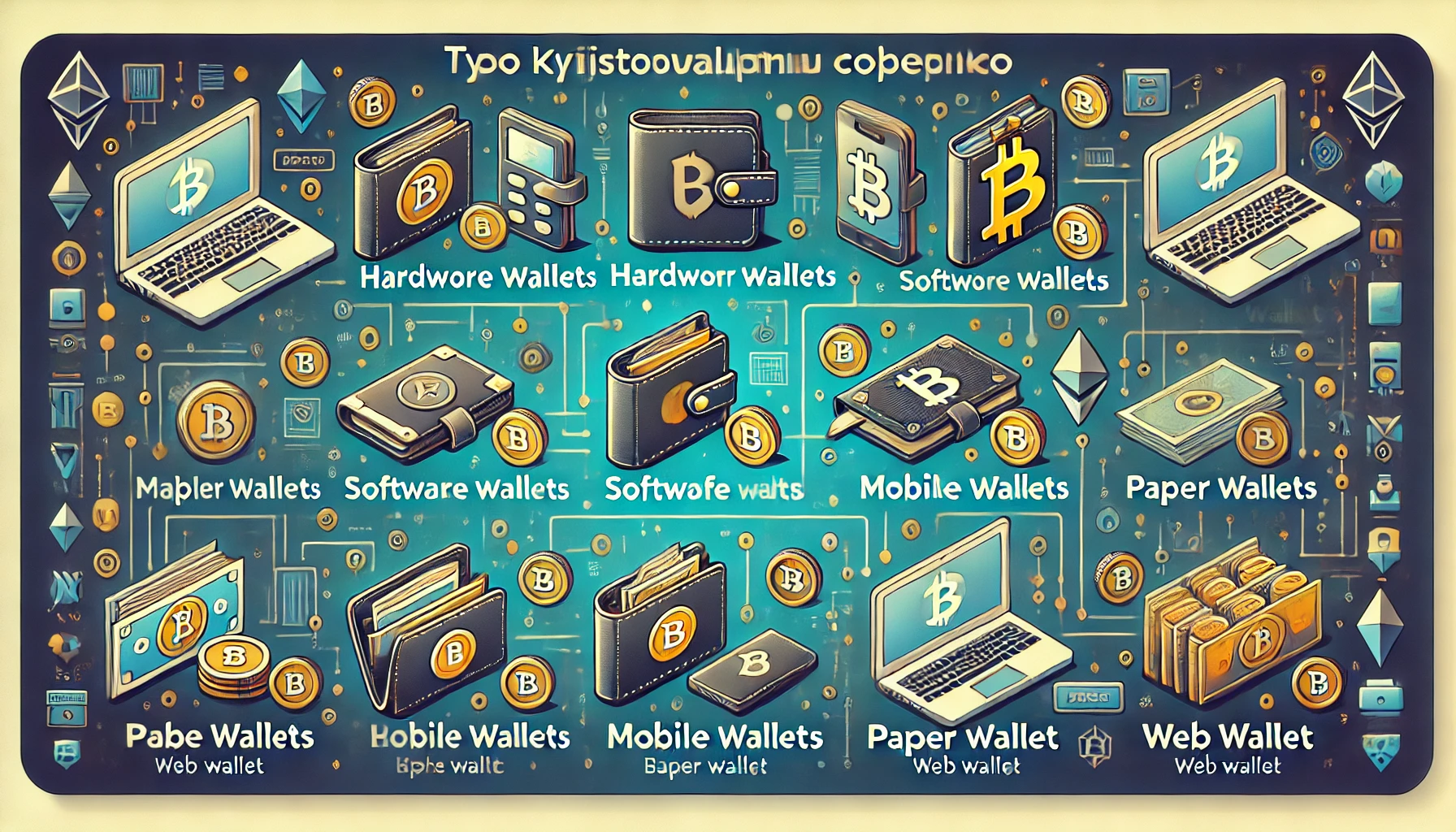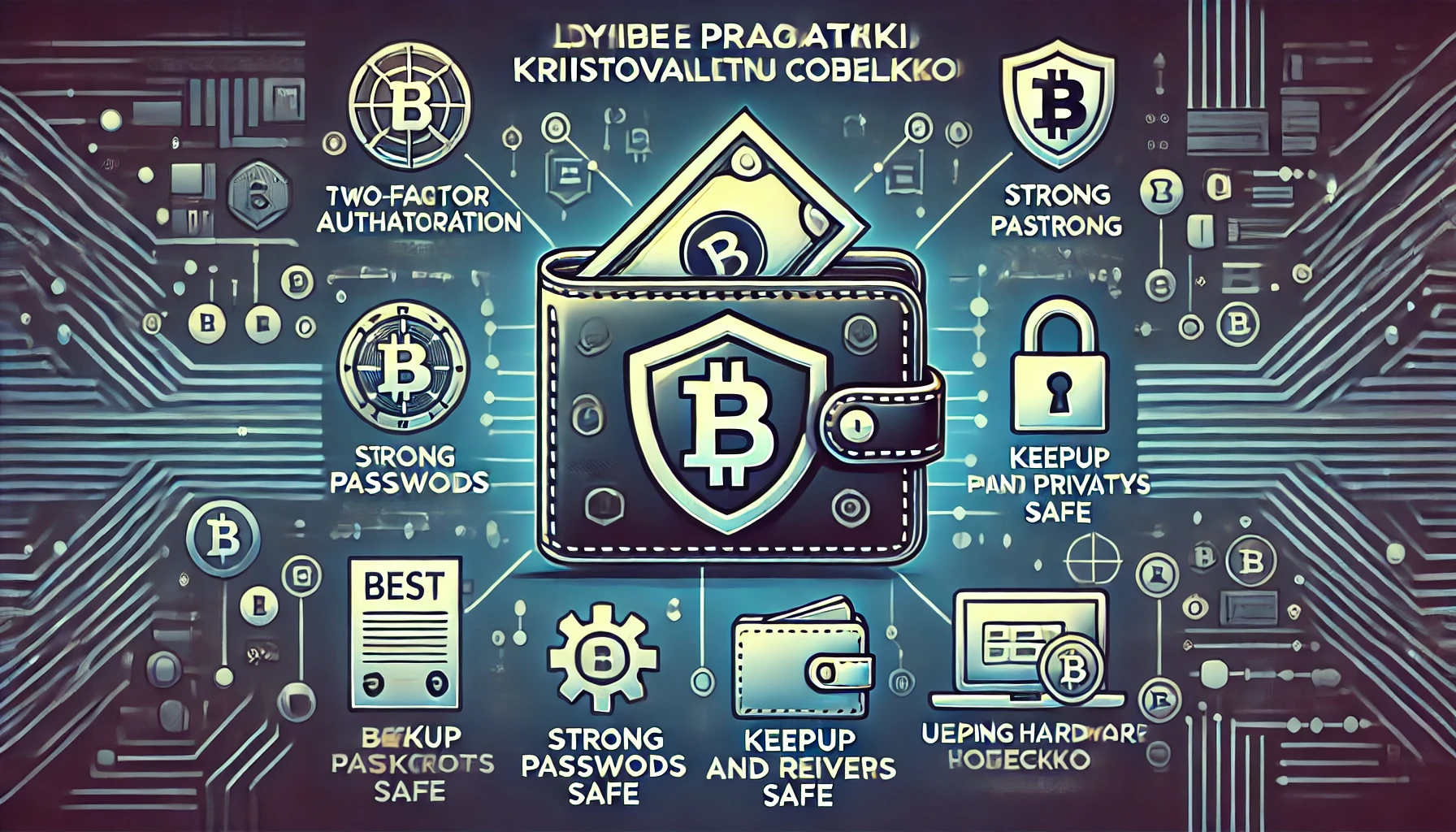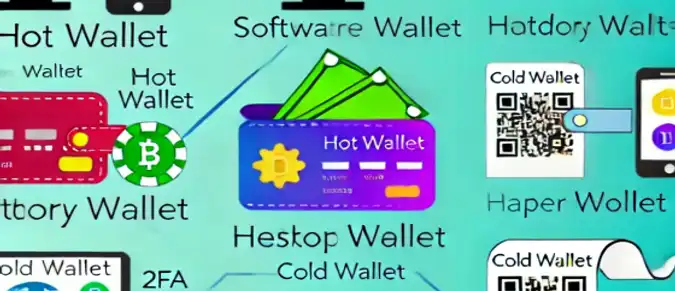Cryptocurrency wallets are tools for effective management and storage of digital assets, providing users with exclusive access to their private keys.
- What are cryptocurrency wallets and why are they necessary?
- How cryptocurrency wallets work: public and private keys
- Types of cryptocurrency wallets
- Choosing the right cryptocurrency wallet
- Best security practices for cryptocurrency wallets
- The future of cryptocurrency wallets

What are cryptocurrency wallets and why are they necessary?
An integral part of the cryptocurrency ecosystem, cryptocurrency wallets are devices used to store and manage cryptocurrencies. They store cryptographic keys needed to access digital assets and allow transactions in blockchain networks. Owners of cryptocurrency wallets can transfer, receive, or hold their cryptocurrency using their private keys.
Contrary to common misconception, cryptocurrency wallets do not physically store cryptocurrency. Wallets serve as entry points, providing users access to the blockchain, which stores information about their digital assets.
Users' private and public keys are stored in the wallet, allowing them to track their balance and sign transactions. Cryptocurrency resides on the blockchain. The wallet acts as a conduit for communication between the user and the blockchain, ensuring secure fund transfers by storing cryptographic keys and verifying ownership.
How cryptocurrency wallets work: public and private keys
The functionality of cryptocurrency wallets is based on the use of public and private keys, which are fundamental components of cryptographic systems.
Here is a brief overview of how cryptocurrency wallets work with public and private keys:
Interaction from the sender's side:
- The sender takes the data they want to send.
- The data goes through the SHA256 hash function, which generates a hash code.
- The hash code is signed with the sender's private key, creating a digital signature.
Recipient
- The recipient takes the digital signature and uses the sender's public key to decrypt and obtain the hash code of the data.
- The recipient takes the same data as the sender and passes it through the same SHA256 hash function to generate their own hash code of the data.
- The recipient compares the two hash codes. If they match, it confirms the authenticity and integrity of the data.
It is also worth noting the role of public and private keys in the operation of a cryptocurrency wallet:
Public Key
The public key is similar to a bank account number. When a user creates a cryptocurrency wallet, the mechanism generates a public key. Exchanging this cryptographic code allows the user to receive cryptocurrency from other users. The user's public key is the place where other users can send digital assets.
Private Key
The private key functions similarly to a bank account password. Cryptocurrency associated with the user's public key can be accessed and controlled only using that user's private key. Users can confirm transactions and establish their ownership of cryptocurrency using their private key.
A pair of public and private keys is generated when creating a cryptocurrency wallet. To receive cryptocurrency, users provide their public key (wallet address) to the sender. When sending cryptocurrency, the sender signs the transaction with their private key to confirm ownership and authorize the transfer.
The network uses the public key to verify the signature, ensuring the authenticity of the transaction. Then, miners or validators verify the transaction and add it to the blockchain. For example, a friend might send Bitcoin (BTC), using the recipient's public key and signing the transaction with their private key, which is then verified and recorded in the blockchain.

Types of cryptocurrency wallets
There are several types of cryptocurrency wallets, each with its unique use cases. Overall, they can be divided into two categories: hot wallets and cold wallets.
Hot Wallets (Software Wallets)
Thanks to their convenient design, hot wallets are great for quick access to funds for regular transactions. Although these wallets are easily accessible on various devices, they are more vulnerable to cyber threats due to their constant connection to the internet.
There are several types of hot wallets:
- Web Wallets
Web wallets, or online wallets, accessible through browsers or cloud servers, come in two types: custodial and non-custodial. Custodial wallets, common on platforms such as Coinbase and Kraken, store private keys on servers, meaning the platform has access to the user's funds. On the other hand, non-custodial wallets, often in the form of browser extensions like MetaMask, Coinbase Wallet, and Trust Wallet, store private keys locally, giving users full control over their crypto assets.
- Mobile Wallets
Mobile wallets, such as Trust Wallet, are apps installed on smartphones that allow users to manage their cryptocurrencies directly from their phone. These wallets offer convenient features, such as QR code scanning. Some mobile wallets also offer advanced features, such as staking for rewards and access to decentralized applications (DApps) for interaction with the broader blockchain ecosystem.
- Desktop Wallets
Desktop wallets, such as Exodus, are software applications installed on a laptop or personal computer. Since private keys are stored locally on the user's device, they provide better security than web wallets. Many desktop wallets also offer advanced features, such as multi-signature transactions that require multiple approvals for additional security, and compatibility with hardware wallets for the highest level of protection.
Cold Wallets
Cold wallets are physical devices specifically designed for offline storage of digital assets, making them less vulnerable to online threats compared to hot wallets.
There are two types of cold wallets:
- Hardware Wallets
Hardware wallets are physical devices intended for secure offline storage of cryptocurrency private keys. Such offline storage significantly increases security against theft and hacking attempts. Users connect a hardware wallet to a computer or mobile device only when they need to manage their funds or make transactions.
With their focus on security, hardware wallets are ideal for long-term storage of large sums of cryptocurrency. Popular examples include the Ledger Nano X and Trezor Model T.
- Paper Wallets
Paper wallets involve printing private and public keys on paper, often accompanied by QR codes for ease of transactions. However, the physical nature of paper wallets requires careful storage to prevent damage, loss, or theft. Moreover, regular transactions can be inconvenient as they require manual key entry or QR code scanning.
Choosing the right cryptocurrency wallet
To ensure secure and efficient management of cryptocurrencies, it is necessary to consider aspects such as security, ease of use, accessibility, and supported cryptocurrencies.
| Selection Criteria | Description |
|---|---|
| Security | Security should be the primary concern of users when choosing a cryptocurrency wallet. Explore the wallet's security features, including support for multi-signature, encryption, and two-factor authentication (2FA). |
| Accessibility | Users should ask themselves how often they will need access to their cryptocurrency. Hot wallets are good for frequent transactions, as users can access their cryptocurrency anytime and anywhere. However, cold wallets are more suitable for long-term storage. |
| Supported Cryptocurrencies | The wallet should be compatible with the cryptocurrencies the user plans to use for transactions and storage. Ideally, the wallet should support a wide range of digital assets. Users should check the documentation to determine which cryptocurrencies the wallet supports. |
| Cost | Hardware wallets have excellent security features but can be more expensive. On the other hand, most software wallets can be downloaded for free, but they have security issues due to their connection to the internet. Users should find a balance between security, convenience, and cost. |

Best security practices for cryptocurrency wallets
To ensure the security of cryptocurrency wallets, users should take a multi-faceted approach, including the use of two-factor authentication (2FA), monitoring wallet activity, and regularly updating software.
Two-Factor Authentication (2FA)
Applying two-factor authentication requires a second form of verification, in addition to a password. Typically, this is a temporary code sent to a linked mobile device, adding an extra layer of security to cryptocurrency wallets.
Exercising Caution
Users should be cautious when discussing their cryptocurrency assets or transactions, especially on social media or in public places. Disclosing details about investment plans, transaction histories, or wallet addresses can expose their funds to risks from criminals.
Software Updates
Updating software with the latest security patches is important for the security of cryptocurrency wallets. Users should check their devices for malware, avoid clicking on dubious links, and refrain from downloading files from untrustworthy sources.
Monitoring Wallet Activity
Users should regularly check their wallet activity and transaction history to detect unusual or suspicious activity. Wallets typically allow users to set up alerts or notifications for incoming and outgoing transactions. If any unusual behavior is detected, it is necessary to take quick action to protect the wallet.
The future of cryptocurrency wallets
In the rapidly changing world of digital finance, it is important to ensure the security and ease of use of cryptocurrency wallets. New technologies are emerging, aimed at enhancing the security and convenience of cryptocurrency wallets.
Encryption Capable of Resisting Quantum Computing
Encryption resistant to quantum computing ensures that digital assets will remain protected from attacks by powerful quantum computers, providing long-term security.
Biometric Authentication
Using unique physical characteristics, such as fingerprints and facial scans, makes wallets inaccessible to criminals.
Multi-Signature Solutions
Multi-signature solutions will become more user-friendly for beginners and will be integrated into standard cryptocurrency wallets, providing an additional layer of security without the usual complexity.
Smart Contract Integration
Automating security functions, such as transaction limits and recovery processes through smart contracts, makes cryptocurrency wallets less vulnerable to human error and fraud.
Decentralized Identification (DID)
Decentralized identification allows users to control their identity and authenticate without revealing too much personal information. Similarly, artificial intelligence (AI) and machine learning (ML) can detect unusual patterns and potential security threats in real-time, providing proactive protection for cryptocurrency wallets.



